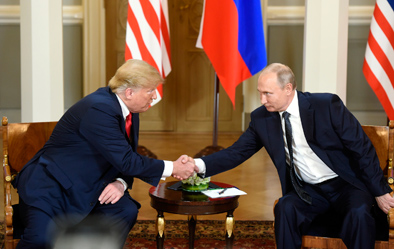Angering US, Trump sides with Putin
- By Sajjad Malik
 0 Comment(s)
0 Comment(s) Print
Print E-mail China.org.cn, July 22, 2018
E-mail China.org.cn, July 22, 2018

U.S. President Donald Trump has created another controversy. This time, his meeting with Russian leader Vladimir Putin in Helsinki and a rather imbecilic joint press conference are the cause of the firestorm. He is under attack from both the right and left for letting down the country's intelligence community by doubting their findings on Russian meddling in the 2016 presidential election.
Trump's victory in the election has been under the spotlight from day one due to alleged Russian cyber interference to tip the scales in his favor by harming the prospects of rival Hillary Clinton. Though a thorough probe by special counsel Robert Mueller is still underway, several senior U.S. officials have said that there is sufficient proof of hidden Russian hands deftly working for the president.
At the joint press briefing after the Helsinki summit, Trump ostensibly accepted the assurances given by Putin that the allegations were not true. This landed him in trouble; by siding with the opinions of an archrival on a very sensitive matter, Trump unwittingly let down his own intelligence agencies.
The summit itself was not very successful either. Putin was right to say that it was just the first step, and that several top-level meetings would be needed to build trust and address some of thorniest issues between the two powers.
Trump had decided to go ahead with the meeting after sidestepping suggestions that the current moment was not the best time for parleys with Putin. But this put him in an awkward position when he failed to get any kind of assurance from Russia on Syria, Crimea or Ukraine.
And he poured oil on the fire by submitting to Putin's account of the meddling issue while completely ignoring his own officials' claims. This has broadly united Americans' opinion against their president. There is a general view that Trump should have waited till the conclusion of the Mueller probe before giving any such pass to Putin and his oligarchs.
His opponents also insist that Trump, being the leader of the most powerful nation on earth, should have looked straight into the eyes of his Russian counterpart and told him point-blank that any kind of meddling in U.S. domestic politics is not acceptable. Yet he chose not do so, for reasons perhaps known only to him.
To be fair to Trump, he has been trying to rebuild relations with Russia after decades of mistrust and animosity. And he has faced only opposition from the traditional anti-Russian establishment and bureaucracy. Old feelings about an evil Russian empire trying to overpower Western liberal political and economic values are still common. U.S. policymakers are not wholly out of their Cold War hangover. A resurgent Russia, having annexed Crimea and turned the tide of events in Syria, is considered a threat, just like it was in the heydays of communism. Past and present Russian governments – from the czars to the U.S.S.R. to Putin's Russian Federation – have done little to allay these kinds of fears. The threat of Russia's expansionist designs impacted generations of scholars, politicians and even ordinary people in North America and the rest of Europe. An American president is supposed to stand tall before Russia as a leader of the liberal world, while the nation feels a sense of superiority in their diplomacy, politics, economics and defense.
Trump has been trying in vain to bypass this unwritten protocol, and has been insisting that good ties with Russia are in the interest of his country. He is more focused on building the economic might of America. There is nothing wrong with such ideas, but he cannot go it alone, as is his wont. He should have to take along the establishment – including the intelligence community, the Department of Defense, and the major political parties, including its right-wing elements that he is supposed to represent.
Instead of following the safer path, Trump has tried for a shortcut, and met with Putin in order to build a cooperative relationship at the cost of ignoring tenuous issues. It has backfired and created only more bumps in the road for him.
Trump should follow his vision as president, but he needs to change his attitude. He could have easily avoided the latest controversy by not being so direct during his interactions with media after the summit. Even a simple change in his choice of words, no matter how small, could have gone a long way.
Sajjad Malik is a columnist with China.org.cn. For more information please visit:
http://91dzs.com/opinion/SajjadMalik.htm
Opinion articles reflect the views of their authors, not necessarily those of China.org.cn.





